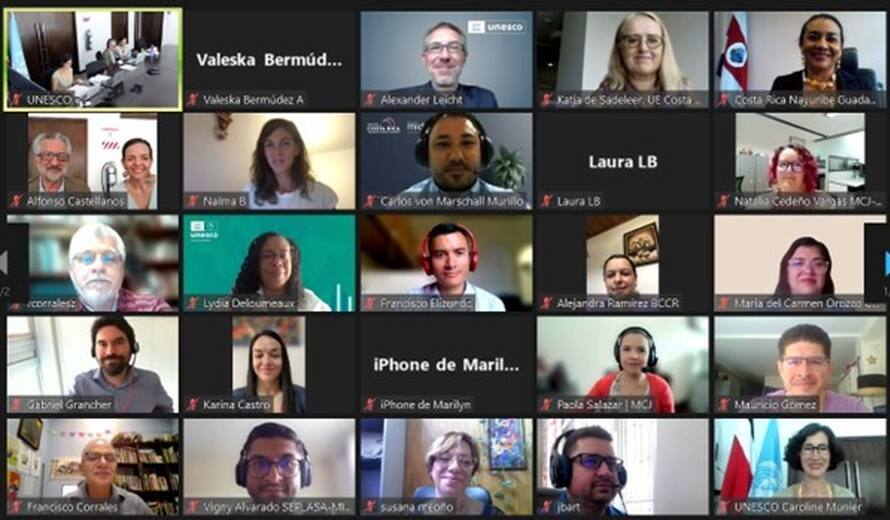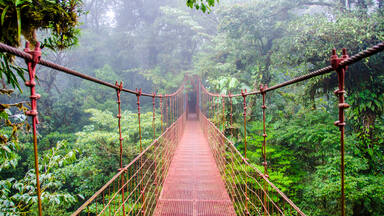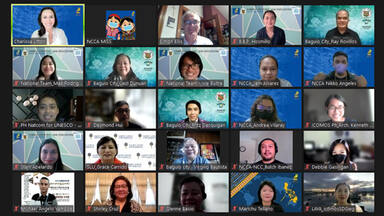Costa Rica and the city of Alajuela - Restitution workshop for the UNESCO Culture|2030 Indicators
On 11 August 2022, the final restitution workshop for the pilot implementation of the UNESCO Thematic Indicators for Culture in the 2030 Agenda (UNESCO Culture|2030 Indicators) was organized by the Ministry of Culture and Youth and the Municipality of Alajuela in close collaboration with UNESCO.
The workshop was held online, gathering more than 20 participants, including representatives from national and local stakeholders, institutions, and authorities. The workshop was an opportunity to present the implementation results, demonstrating culture’s transversal contribution to sustainable development in the 2030 Agenda. The workshop also served to promote results dissemination, encourage policy action at national and urban level, and seek inputs from stakeholders on policy recommendations towards strengthening data collection, measurement, and monitoring for culture.
The pilot implementation of the UNESCO Culture|2030 Indicators in Costa Rica and the city of Alajuela was launched in February 2022 by the Ministry of Culture and Youth and the Municipality of Alajuela in partnership with UNESCO and in collaboration with the UNESCO Institute for Statistics. Implementation was made possible thanks to the generous financial contribution of the European Union and the Swedish International Development Cooperation Agency (Sida).
The implementation succeeded in achieving the goal of collecting culture data and building the foundation for more reliable measurement systems to show the multiple ways culture contributes to the economic, social, and environmental dimensions of sustainable development. The UNESCO Culture|2030 Indicators framework is composed of 22 indicators in four thematic dimensions, measuring culture’s contribution as a sector of activity in itself and transversally as an intrinsic component present in other sectors.
This achievement was only made possible with the collaboration and engagement of a wide of range of stakeholders involved in the policy spectrum: Ministries, departments, Mayoral offices, municipalities, agencies operating in the four thematic dimensions of the framework, culture related organizations and networks, civil society and professional organizations, research institutions including academia and national institutes.
The workshop concluded the UNESCO Culture|2030 Indicators data collection and participants from Costa Rica and Alajuela recognized the framework of the indicators as a breakthrough, underlining that it allowed them to refine the analysis of the transversal contribution of culture across policy domains and the different Sustainable Development Goals of Agenda 2030.
Mr. Ernesto Ottone R., the Assistant Director-General for Culture of UNESCO, thanked Costa Rica and Alajuela for participating in the pilot implementation and stressed that the data collected and analyzed will inform decision-makers, concrete measures and policies, with the aim of enabling greater investment in culture and further recognition of its cross-cutting role in other sectors. He believed that the UNESCO Culture|2030 Indicators would help decision-makers build a solid, coherent, and evidence-based discourse on culture and development. He hailed that the data collected will enrich the UNESCO Culture|2030 Indicators’ Data Bank, which will facilitate future updates and analysis of local, national, regional, and global trends. He also invited participants to consider the restitution workshop as a starting point in the process of monitoring and updating data on culture.
Ms. Nayuribe Guadamuz Rosales, Minister of Culture and Youth, Mr. Alexander Leicht, Director of UNESCO's Cluster Office in San José, Ms. Sofía González Barquero, Deputy Mayor of Alajuela, Ms. Katja de Sadeleer, Chargé d'Affaires a. i. of the Delegation of the European Union in Costa Rica, as well as Ms. Marianne von Malmborg and Ms. Elsa Helin of the Swedish International Development Cooperation Agency provided opening words, highlighting the high expectations raised by the project towards building evidence-based policies.
The Minister of Culture and Youth emphasized that Costa Rica was aware that the presentation of the report is not a conclusion, but the beginning of a process of growth and improvement. ‘Undoubtedly, the generation of data is a tool that contributes to the creation of strategies and public policies that strengthen our creative and cultural sector’. She added that ‘it is hoped that this effort will contribute to the strategic positioning of culture in the global sustainable development agenda’.
Ms. Sofía González Barquero, Deputy Mayor of Alajuela, delivered the welcoming message for the workshop on behalf of the city. She emphasized the strong interest of her administration in facilitating the pilot implementation in Alajuela and recalled the continuous efforts undertaken throughout this project by Alajuela in this regard. She further demonstrated a solid engagement of her City to remain active in the implementation of the UNESCO Culture|2030 Indicators.
Ms. Mónica Salazar Herrera, the National Expert for Costa Rica, contextualized the implementation of the framework and provided an overview of the main benefits obtained and the mechanisms put in place to support the activities. She stressed the significance of the project as an innovative framework to collect and analyze data on culture, in view of elaboration of concrete policies and actions to foster sustainable development in Costa Rica.
Mr. Alfonso Castellanos Ribot, UNESCO Regional Expert, provided an overview of the challenges and opportunities encountered in the implementation and presented the main findings in collaboration with the national and local experts. Ms. Naima Bourgaut, UNESCO International Expert, supported the presentation and elaborated on the highlights of the data collection process and their analysis. Following feedback and exchanges between stakeholders and national and local authorities, participants outlined policy recommendations stemming from the analysis of the results.
The exchanges on the results of the implementation, facilitated during the workshop by the national and local implementation teams along with the UNESCO Regional Expert, will be instrumental to the finalization of the National and Urban Reports on the pilot implementation for the Costa Rica and the City of Alajuela.
The implementation highlighted the need for better collection of culture data including sex-disaggregated data in order to make visible the contribution of culture to Goal 5 on ‘Gender equality’, which is notably lacking on a more global level as well. The framework addresses SDG 5 transversally by allowing for the appreciation of sex-disaggregated data across a number of different data points from access to opportunities and participation in social, economic, political and cultural life. The implementation sought to include sex-disaggregated data wherever possible.
The workshop achieved its objective of presenting the main findings of the implementation of the UNESCO Culture|2030 Indicators, promoting results dissemination to encourage policy action at national and urban level and advocating for commitments from stakeholders to support future monitoring and data collection.
The meeting was closed by Ms. Caroline Munier, Culture Program Specialist of the UNESCO Office in San José, who thanked all participants, the national and local teams and especially the stakeholders for their contribution during the project duration.
For further information on the pilot implementation in Costa Rica and in the city of Alajuela, please consult the following webpage: https://whc.unesco.org/en/activities/1194/.
To learn more about the UNESCO Culture|2030 Indicators framework, please consult the following webpage: UNESCO Culture|2030 Indicators
Costa Rica and the city of Alajuela



